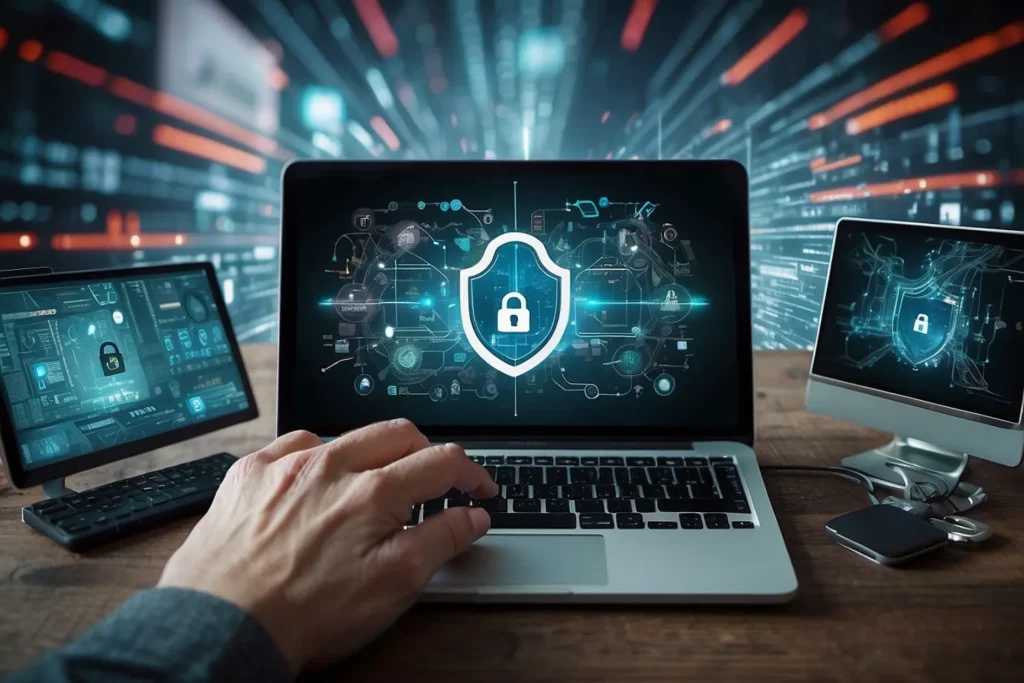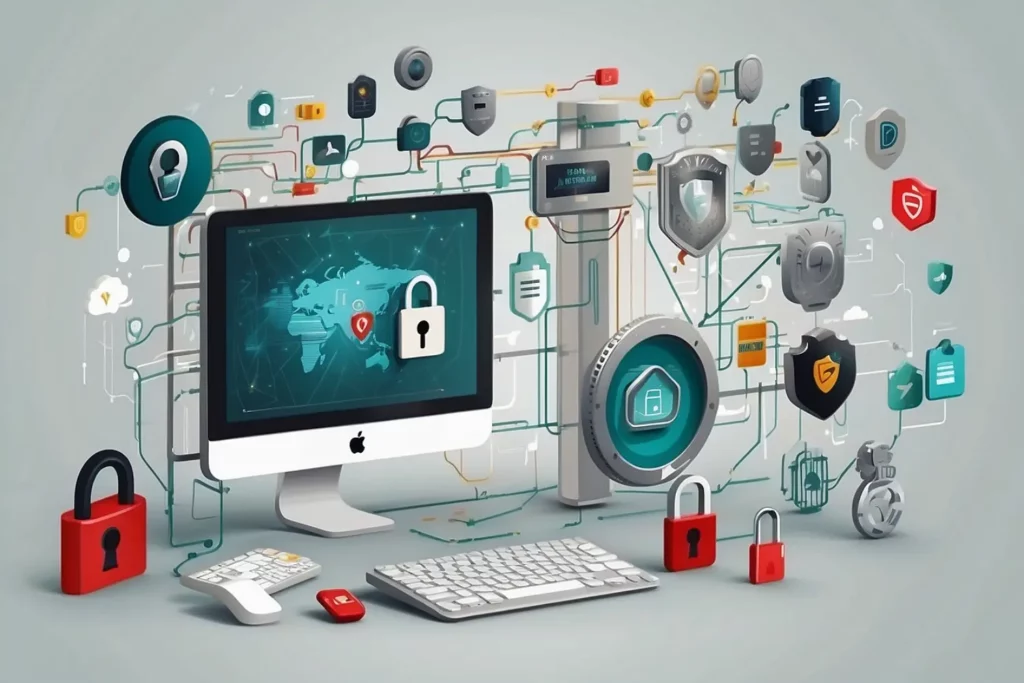
In a world where our personal data is constantly at risk, keeping your online life private can feel like a never-ending battle. Statistics show that the VPN market is set to soar, reflecting the growing concern for internet privacy among users like you.
This blog will guide you through the future of digital privacy and how Virtual Private Networks (VPNs) are changing to protect it. Stay informed on staying safe online—keep reading!
Key Takeaways
- VPN usage is skyrocketing due to increased cyber threats and the shift towards remote work, with a predicted growth in the market.
- Advanced VPN technologies such as AI-powered, quantum-safe, and decentralised networks are emerging to enhance online privacy protection.
- Encryption is vital for securing data transmission online; using robust encryption protocols like AES-256 in VPNs is essential for maintaining privacy.
- The rise of 5G technology necessitates the development of 5G-compatible VPNs that ensure high-speed internet access without compromising security.
- Choosing a reliable and trustworthy VPN provider with strong encryption, a no-log policy, and good customer support is critical for safeguarding personal information on the internet.
The Growing Demand for VPNs
With the increase in cyber threats and privacy concerns, there has been a growing demand for VPNs. The remote work trend has also contributed to the surge in VPN usage.
Increase in Cyber Threats
Cyber threats are soaring at an alarming rate, with hackers constantly finding new ways to break into our digital lives. Personal information is at risk as these cybercriminals employ sophisticated methods to breach security systems.
Parents and office workers alike must stay vigilant, as internet users of all ages can become targets for identity theft, phishing scams, and malicious software assaults.
To tackle this rise in online dangers, VPN technology has become a lifeline for ensuring privacy and security on the web. By encrypting data and hiding IP addresses, VPNs provide a robust shield against unwanted snooping and cyber-attacks.
With the digital landscape evolving rapidly, it’s crucial that individuals arm themselves with tools like VPNs to defend against increasingly pervasive online threats that can compromise everything from family photos to sensitive work documents.
Privacy Concerns

Online privacy concerns have skyrocketed in recent years due to the increasing threat of cyber-attacks, internet surveillance, and data breaches. With the rise of online platforms and remote work arrangements, individuals are more susceptible to potential privacy infringements.
As a result, there is a growing demand for tools such as Virtual Private Networks (VPNs) that can provide enhanced encryption and anonymity. The future of online privacy hinges on protecting personal data from unauthorised access or exploitation, making VPNs an essential aspect of safeguarding digital lives.
Parents seeking to protect their children’s online activities, office workers handling sensitive corporate information, and everyday internet users are increasingly recognising the importance of shielding their data from prying eyes.
This awareness has led many individuals to turn towards encryption technology and VPN services as effective measures against potential threats to their online security and privacy.
Remote Work Trend
Remote work has become a prevalent trend, especially in the wake of global events, with many individuals choosing to work from home for added flexibility and convenience. This shift to remote work has raised concerns about online privacy and security as employees access company networks through personal devices.
With the increasing reliance on virtual private networks (VPNs) for secure connectivity, it’s vital for individuals to stay informed about best practices for protecting their data and maintaining internet privacy.
As companies continue to adapt to remote work arrangements, the demand for VPNs is expected to rise significantly. Employers are likely to seek more robust methods of securing sensitive information accessed by their remote workforce.
In light of this, it’s crucial for individuals and organisations alike to be proactive in adopting encryption tools and VPN services that offer reliable protection against cyber threats.
Advancements in VPN Technology
Advancements in VPN technology are paving the way for more secure and private online experiences, including AI-powered VPNs, quantum-safe VPNs, decentralised VPNs, multi-cloud VPNs, edge computing and privacy-focused 5G VPNs.
The future of online privacy is being shaped by these innovative developments.
AI-Powered VPNs
AI-powered VPNs use machine learning algorithms to constantly adapt and optimise security protocols, providing advanced protection against evolving cyber threats. These VPNs analyse network traffic patterns in real-time, identifying and mitigating potential risks before they can infiltrate your device or data.
By leveraging AI technology, these VPNs offer enhanced encryption and privacy features, ensuring a more secure online experience for users. With the increasing sophistication of cyber-attacks, AI-powered VPNs play a crucial role in fortifying internet privacy and safeguarding sensitive information from unauthorised access.
Moreover, AI-powered VPNs are designed to seamlessly integrate with various devices and platforms while maintaining high performance and reliability. This makes them well-suited for individuals and businesses seeking robust protection without sacrificing user experience or productivity.
Quantum-Safe VPNs
Quantum-safe VPNs are the future of online privacy protection, offering an advanced level of security against potential quantum computing threats. With the increasing possibility of quantum computers breaking traditional encryption methods, it’s vital to adopt quantum-safe VPNs that can withstand such risks.
These VPNs use algorithms resistant to attacks from quantum computers, ensuring your data remains secure and private in this rapidly evolving digital landscape. As online privacy regulations continue to tighten and cyber threats become more sophisticated, implementing quantum-safe VPN technology will be crucial for safeguarding sensitive information.
Looking ahead, the development and widespread adoption of quantum-safe VPNs will play a pivotal role in bolstering online privacy and security for individuals and businesses alike.
By incorporating these cutting-edge solutions into our digital practices, we can stay one step ahead of emerging cyber threats while maintaining essential aspects of internet privacy.
Decentralised VPNs

Decentralised VPNs, also known as dVPNs, are a promising development in the world of online privacy. These innovative networks operate without the need for a central server, offering users greater security and anonymity when accessing the internet.
With dVPNs, users can enjoy enhanced protection against potential cyber threats and access restricted content with ease. As the digital landscape continues to evolve, decentralised VPNs are expected to play a vital role in safeguarding online privacy.
The growth of dVPNs is particularly significant in light of increasing concerns about data privacy and surveillance. By leveraging decentralised networks, individuals gain more control over their online activities and protect their sensitive information from prying eyes.
Multi-Cloud VPNs
Moving from the realm of decentralised VPNs to the next frontier of online privacy, multi-cloud VPNs are gaining traction as a crucial tool in safeguarding internet privacy. As businesses and individuals increasingly rely on multiple cloud service providers for various needs, multi-cloud VPNs offer a seamless and secure approach to connecting and protecting data across different cloud environments.
With the rise in hybrid cloud strategies, multi-cloud VPNs provide an efficient way to maintain security and privacy standards across diverse platforms while ensuring smooth connectivity.
As digital landscapes become more complex with the integration of multiple cloud services, multi-cloud VPNs play a vital role in ensuring data protection and secure communication. This innovative solution promises enhanced control over network traffic, robust encryption methods, and reliable access management across disparate cloud infrastructures.
Edge Computing and VPNs
Edge computing and VPNs work hand in hand to ensure online privacy and security. With the rise of edge computing, data processing occurs closer to the source, reducing latency and increasing efficiency.
This decentralised approach requires robust security measures, making VPNs essential for safeguarding sensitive information transmitted through edge networks. As cyber threats continue to evolve, the combination of edge computing and VPNs offers a proactive defence against potential vulnerabilities.
The integration of edge computing and VPN technology allows for secure access to critical data from remote locations, enhancing productivity for office workers and providing peace of mind for parents concerned about their children’s online safety.
Privacy-Focused VPNs

Privacy-focused VPNs are becoming increasingly important in an era of heightened online surveillance and data privacy concerns. As internet users become more aware of the need to protect their personal information, the demand for VPNs that prioritise privacy and security is on the rise.
With features such as advanced encryption protocols, strict no-logs policies, and secure server locations, these VPNs offer a shield against potential privacy breaches and unauthorised access to sensitive data.
In response to growing concerns about online privacy, parents, office workers, and all internet users should consider using privacy-focused VPNs to safeguard their digital activities.
5G VPNs
The rapid evolution of internet technology has given rise to the emergence of 5G VPNs. With the imminent arrival of widespread 5G connectivity, VPNs are set to become even more integral in safeguarding online privacy and security.
As internet speeds soar and connectivity becomes increasingly seamless, 5G VPNs will offer enhanced protection for personal data and sensitive information transmitted over lightning-fast networks.
Embracing this advanced technology will be imperative for individuals and businesses alike to maintain robust digital privacy amid the upcoming era of ultra-fast 5G networks.
The combination of 5G technology and VPNs holds significant promise for ensuring secure online experiences. As users transition towards faster connectivity, leveraging 5G VPNs will be vital to counteract potential cyber threats while maximising the benefits of high-speed internet access.
Potential Challenges and Opportunities for VPNs
Fighting against censorship and maintaining user trust are key challenges for VPNs, while opportunities lie in adapting to changing technology and evolving privacy concerns.
Fighting Against Censorship
To combat censorship, VPNs play a crucial role in enabling access to unrestricted content and evading government-imposed restrictions. By encrypting internet traffic, VPNs provide users with the ability to bypass local censorship laws and access blocked websites, ensuring freedom of information and expression online.
This is especially important for individuals living in countries with strict internet regulations or facing government suppression of free speech.
Moving forward to “Maintaining User Trust”.
Maintaining User Trust
Keeping user trust in VPN technology is imperative for ensuring secure and reliable online privacy. As the demand for VPNs grows, users expect transparency and accountability from providers to maintain their confidence.
With an expected CAGR of 15.3% in the VPN market by 2026, maintaining user trust becomes even more crucial. Providers must prioritise data protection and clearly communicate how they uphold user privacy.
VPN users are increasingly concerned about internet security, making it vital for providers to implement robust privacy-focused practices that align with encryption standards. The importance of establishing and preserving a trustworthy relationship with users cannot be overstated as VPNs continue to play a pivotal role in safeguarding online lives across various industries.
Adapting to Changing Technology
VPN technology is continually evolving to keep up with the changing digital landscape. Innovations such as decentralised VPNs, quantum-safe encryption, and mobile-first approaches are reshaping the future of online privacy.
With the rise of 5G networks and edge computing, VPNs are adapting to ensure enhanced speed, reliability, and security for internet users.
As cyber threats become more sophisticated, VPN providers are also focusing on developing AI-powered and privacy-focused VPNs to meet the increasing demand for secure online experiences.
The Role of Encryption and VPNs in Protecting Online Privacy

Encryption and VPNs play a crucial role in safeguarding online privacy by securing data transmission and masking IP addresses. Choosing the right encryption and VPN tools, as well as following best practices, are essential for protecting sensitive information from potential threats.
What is Encryption?
Encryption is a method of converting data into a code to prevent unauthorised access. It crucially safeguards sensitive information from cyber threats and hackers, ensuring that only authorised parties can decipher the data.
Encryption helps protect personal and financial details when transmitting them over the internet, making it an essential tool for maintaining online privacy. With encryption, individuals can feel confident that their emails, messages, and other digital communications are secure from prying eyes.
Virtual Private Networks (VPNs) further enhance online privacy by encrypting internet traffic and routing it through remote servers. This adds an additional layer of security by masking users’ IP addresses and locations, effectively safeguarding private information from potential breaches.
What are Virtual Private Networks (VPNs)?
Virtual Private Networks (VPNs) are secure networks that allow users to access the internet privately and securely. They encrypt data, making it unreadable to anyone who might intercept it, thus protecting user privacy.
By connecting to a VPN server, users can mask their IP address and browse the web anonymously. This means that personal information such as location and browsing history remains private from potential cyber threats and prying eyes.
In addition, VPNs enable users to bypass geo-blocks and access restricted content or websites not available in their region. This is particularly useful for office workers needing access to corporate resources while working remotely or parents ensuring safe online experiences for their children.
Choosing the Right Encryption and VPN tools
To ensure the best protection for your online privacy, it’s crucial to select the most suitable encryption and VPN tools. Here are some key aspects to consider:
- Research the encryption strength of the VPN: Ensure that the VPN you choose offers strong encryption protocols such as AES-256, which provides robust security for your data.
- Check for a strict no-logs policy: Look for VPN providers that uphold a strict no-logs policy, meaning they do not store any user activity or connection logs, thus ensuring your privacy is maintained.
- Evaluate server locations and coverage: Consider a VPN with a wide range of server locations to ensure reliable and secure connections, allowing access to geo-blocked content while maintaining privacy.
- Assess compatibility with different devices: Choose a VPN that is compatible with various operating systems and devices, ensuring that all your internet-connected gadgets are protected.
- Look for additional security features: Select a VPN that offers additional security features such as an automatic kill switch, DNS leak protection, and split tunnelling to enhance your online privacy.
- Consider user-friendly interface and customer support: Opt for a VPN provider with an intuitive interface and responsive customer support to ensure seamless usage and assistance whenever needed.
- Review independent audits and reviews: Prioritise VPNs that have undergone independent security audits from reputable organisations and garnered positive reviews from users regarding their effectiveness in protecting online privacy.
- Ensure high-speed performance: Choose a VPN with minimal impact on internet speed, allowing you to browse, stream, and work without experiencing significant slowdowns.
- Seek transparent ownership and jurisdiction information: Look for transparency in ownership details and jurisdiction information of the VPN provider as this can indicate accountability and adherence to privacy laws.
- Consider cost versus value: Lastly, weigh the cost of the VPN subscription against its features, performance, and added value in securing your online privacy effectively.
Best Practices for Using Encryption and VPNs

Encryption and VPNs are essential tools for protecting your online privacy and security. Here are some best practices for using encryption and VPNs:
- Regularly update your encryption software to ensure the latest security measures are in place to safeguard your data from potential vulnerabilities.
- Use strong, unique passwords for your VPN access to prevent unauthorised access to your network and protect your sensitive information.
- Enable two – factor authentication (2FA) for an added layer of security when logging into your VPN to prevent unauthorised access even if someone has somehow obtained your password.
- Choose a reputable VPN service provider that offers robust encryption protocols, a strict no-logs policy, and transparency about their data handling practices to ensure protection and privacy.
- Be cautious of public Wi-Fi networks when using your VPN, as they may leave you vulnerable to cyber threats; always connect through secure networks or use a trusted VPN when accessing public Wi-Fi.
- Keep all devices updated with the latest security patches and antivirus software to fend off potential cyber threats before they can compromise your data.
- Understand the data protection laws in your region and select a VPN provider that aligns with these regulations for added peace of mind regarding the handling of your personal information.
- Avoid downloading copyrighted or illegal content through your VPN connection, as this could lead to legal consequences or impact the reputation of both you and your chosen provider.
In conclusion, VPNs are set to become even more crucial in safeguarding online privacy. The growing demand for VPNs reflects the increasing concern for data security and privacy. As technology advances, the role of VPNs will continue to evolve to meet the challenges and opportunities of a rapidly changing digital landscape.
With encryption and VPNs at the forefront, individuals can take proactive steps to protect their online privacy in an ever-connected world. The future promises exciting advancements that will further empower users to navigate the digital realm with confidence and security.
FAQs
What predictions are there for the future of online privacy?
Many experts believe that the future of online privacy will involve stronger data encryption and increased use of VPNs to protect personal information on the internet.
How do VPNs help with online privacy?
VPNs hide your location and encrypt your data, making it harder for others to track or access your private information when you’re using the internet.
Will we need more online privacy measures in the future?
As technology advances, it’s likely we will need even better privacy measures, like advanced VPN services, to keep our online activities safe from hackers and data breaches.
Can a VPN ensure complete privacy protection in the future?
While a VPN is an essential tool for protecting online privacy by encrypting data, staying completely protected may require additional security practices as threats evolve.
